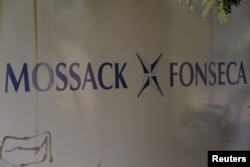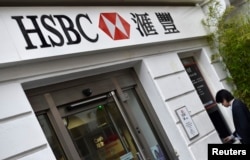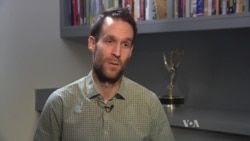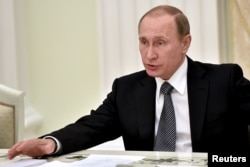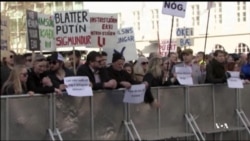The full extent and implications from a leak of records about offshore bank accounts from a Panamanian firm are not yet clear, and more stories about them are expected in the coming days, but already governments across the world are pledging investigations or denouncing the reports as unfounded attacks.
Panama's President Juan Carlos Varela is among those publicly championing transparency, saying his government welcomes any investigation that protects its financial system from abuse.
Will Fitzgibbon, a reporter for the International Consortium of Investigative Journalists that is leading the probe of documents from law firm Mossack Fonseca, told VOA illegal or morally suspicious activities were in the minority among the 220,000 companies in the documents. But he said even with a small percentage facilitating corruption or bribery, that for many advocates is enough to scrutinize the entire offshore system.
"As Mossack Fonseca and others have told us in the industry, they work according to the laws of these nations, of Panama, of the British Virgin Islands, even of the United States, which has a very large offshore industry," Fitzgibbon said. "Therefore, the problem is even I think, according to many advocates, an issue of what is allowed by the laws of countries where these companies are created."
Denial of wrongdoing
Ramon Fonseca, one of the firm's co-founders, has strongly denied breaking any laws. He told the Associated Press that focus on the company is unfair and would not happen if it were based in the United States instead of Panama.
Fitzgibbon said the documents were amazing in the number of "specific requests" companies and individuals made to create offshore companies in order to avoid paying taxes, as well as notices from governments writing to those companies to make those allegations.
The head of Switzerland's Credit Suisse, Tidjane Thiam, said Tuesday his firm only advocates clients use an offshore structure "when there is a legitimate economic purpose." Similarly, British banking giant HSBC said Tuesday it does not condone offshore activity for tax avoidance, and that allegations involving its clients predate its recent reforms.
Credit Suisse agreed to pay the U.S. a $2.5 billion fine in 2014 for helping Americans evade taxes, while HSBC agreed in 2012 to pay $1.92 billion for its role in laundering drug money from Mexico.
An ICIJ report Monday said the Mossack Fonseca documents included more than 500 banks registering 15,600 offshore companies. It said HSBC and its subsidiaries accounted for 2,300 of those shell companies, with Credit Suisse responsible for another 1,100.
Those banks were also among a group that were given special arrangements by Mossack Fonseca that required less due diligence in documenting why clients wanted to create a shell company, ICIJ said, allowing the banks to be insulated from the deals.
Syrian link
The ICIJ report also detailed the creation of offshore companies used by Rami Makhlouf, a powerful billionaire cousin of Syrian President Bashar al-Assad, with accounts at HSBC. It says Mossack Fonseca contacted the bank with concerns about Makhlouf as Syria's civil war was beginning, but was told there was no problem.
"From my part if HSBC headquarters in England do not have an issue with the client, then I think we can also accept him," a Mossack Fonseca partner wrote in an email. The firm later cut ties with Makhlouf's companies.
ICIJ's Fitzgibbon highlighted an offshore company alleged by the U.S. Treasury Department to have supplied oil and fuel to the Syrian government as "one of the most striking examples of harm that can be done through shell companies."
"Syria's been involved in a very deadly barrel bomb-fueled war over many years, so the fact that this company, which allegedly had done these things, was allowed to have offshore companies and to continue using them was for me a pretty stark example of how those two worlds of victim and offshore collide," he said.
WATCH: Interview with ICIJ Reporter Will Fitzgibbon
Russia denounces leak
The Russian government denounced the disclosures, saying Monday they were mostly aimed at President Vladimir Putin and claiming former U.S. State Department and Central Intelligence Agency officials helped analyze the documents.
A report from the leak said Putin associated have funneled nearly $2 billion through offshore accounts.
"This Putinophobia abroad has reached such a point that it is in fact taboo to say something good about Russia or about any actions by Russia or any Russian achievements," Kremlin spokesman Dmitry Peskov said.
Iceland's PM under pressure
In Iceland, Prime Minister Sigmundur David Gunnlaugsson is under pressure to resign after the documents showed he and his wife, Anna Sigurlaug Palsdottir, bought an offshore company in the British Virgin Islands in 2007. He said the couple has not hidden any assets, but stormed out of an interview with a Swedish public broadcaster when pushed to explain the nature of the investment.
Ukrainian lawmakers demanded parliament investigate allegations that President Petro Poroshenko moved his confectionery company, Roshen, to the British Virgin Islands in August 2014 to avoid taxes at a time when there was a peak in fighting between Kyiv's forces and pro-Russian separatists in eastern Ukraine.
A spokeswoman for British Prime Minister David Cameron declined to comment on whether his family had money in offshore accounts set up by his late father, Ian Cameron. She called it "a private matter."
India's Finance Minister Arun Jaitley declared anyone who did not take advantage of a government offer last year to disclose hidden offshore accounts would now find "such adventurism extremely costly."
Norwegian, Austrian and Swedish authorities started investigations of key banks to determine their role in creating offshore accounts, while France said it would review the taxes of individuals mentioned and assess penalties for unpaid taxes.
WATCH: Related video report by Zlatica Hoke
US, France vow investigations
French President Francois Hollande called the leaked documents "good news," saying, "Investigations will be carried out, cases will be opened and trials will be held."
The U.S. Justice Department said it is reviewing the journalists' report and "takes very seriously all credible allegations of high-level, foreign corruption that might have a link to the United States or the U.S. financial system."
An anonymous source provided the millions of documents involving 214,488 companies and 14,153 clients of the Mossack Fonseca law firm to Germany's Sueddeutsche Zeitung newspaper, which in turn engaged the investigative journalists' group to work on the project.
Putting money in offshore accounts is not necessarily illegal, and can be used to establish legal tax shelters or ease international business deals. But the report said the documents show banks, law firms and other offshore players often fail to follow legal requirements to make sure their clients are not involved in criminal enterprises, tax dodging or political corruption.
Economic reporter Jim Randle contributed to this report.





